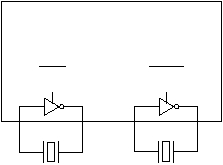IP2022 Data Sheet
www.ubicom.com
27
3.9.1
External Connections
Figure 3-17 shows the connections for driving the OSC or
RTCLK clock sources with an external signal. To drive the
OSC clock source, the external clock signal is driven on
the OSC1 pin and the OSC2 pin is left open. The external
clock signal driven on the OSC1 pin may be any
frequency up to 120MHz. To drive the RTCLK clock
source, the external clock signal is driven on the RTCLK1
input and the RTCLK2 output is left open. The external
clock signal driven on the RTCLK1 pin may be any
frequency up to 120MHz.
Figure 3-17 External Clock Input
Figure 3-18 shows the connections for attaching an
external crystal to the OSC or RTCLK oscillator. For the
OSC oscillator, a crystal between 3MHz and 5MHz is
connected across the OSC1 and OSC2 pins. For the
RTCLK oscillator, a 32.768kHz crystal is connected
across the RTCLK1 and RTCLK2 pins. No external
capacitors are required.
For proper operation of the crystal or resonator, the total
printed circuit board trace length for the OSC1 and OSC2
(or RTCLK1 and RTCLK2) signals must be kept to less
than 1 inch (2.5 cm) each, and the capacitive loading must
be kept to less than 3 picofarads. Routing should be direct
and no vias should be used, with no signals under, over or
next to the OSC1 and OSC2 (or RTCLK1 and RTCLK2)
traces. No jumpers should be used.
Figure 3-18 Crystal Connection
Figure 3-19 shows the connections for attaching an
external ceramic resonator to the OSC oscillator. The
frequency of the resonator must be between 3MHz and
5MHz. The value of the external capacitors C1 and C2 is
5 pF. The RTCLK oscillator may not be used with an
external ceramic resonator.
Figure 3-19 Ceramic Resonator Connection
RTCLK1 RTCLK2
Externally
Generated Clock
Open
515-024.eps
IP2022
OSC1
OSC2
Externally
Generated Clock
Open
515-025a.eps
Crystal
Crystal
IP2022
OSC1
OSC2
XTAL
(FUSE0, bit 15)
RTCLK1
RTCLK2
RTCLK
(FUSE0, bit 14)
C1
515-039a.eps
C2
Ceramic
Resonator
IP2022
OSC1
OSC2
XTAL
(FUSE0, bit 15)

